Employment, Decent Work, and Social Protection are fundamental pillars of sustainable economic growth and integral elements of the United Nations Sustainable Development Goals (SDGs). In particular, they are emphasized in SDG 8: "Promote sustained, inclusive and sustainable economic growth, full and productive employment and decent work for all". Decent work is characterized by fair wages, secure employment contracts, safe working conditions, and the right to join or form a trade union. It is essential for poverty eradication, reducing inequalities, and fostering social inclusion, directly contributing to multiple SDGs, such as SDG 1 (No Poverty), SDG 5 (Gender Equality), and SDG 10 (Reduced Inequalities).
Decent work also links with SDG 4 (Quality Education), as higher education levels often lead to better job opportunities, thereby promoting a cycle of improvement. Meanwhile, social protection is closely aligned with SDG 1 (No Poverty) and SDG 3 (Good Health and Well-being), as it shields vulnerable groups from social and economic risks and ensures access to healthcare, food, and other basic needs. Social protection systems, such as unemployment benefits, pensions, and maternity protection, mitigate social inequalities and vulnerabilities, reducing poverty and ensuring social justice.
Furthermore, the interdependence of employment, decent work, social protection, and the SDGs, underscores the need for an integrated approach to sustainable development. Ensuring decent work and social protection for all not only supports economic growth but also advances socio-cultural development and fosters environmental sustainability, resonating with the three pillars of sustainable development – economy, society, and environment. Hence, the pursuit of decent work and comprehensive social protection for all, contributes to a broad-based and balanced progress towards the attainment of the SDGs.
RX has published a 48-page guide to making events more inclusive. The Guide to Inclusive Events was first produced as an in-house resource for event teams to deliver welcoming, safe and inclusive experiences for all audiences, regardless of industry sector. It has now been made freely available for anyone to access.
International Youth Day 2026
International Youth Day (IYD) is dedicated to drawing attention to the cultural and legal issues surrounding youth. Established by the United Nations in 1999, this day serves as a platform for governments and organizations to address the challenges faced by young people and to recognize their contributions to global development. Observed annually on August 12th, IYD encourages activities that promote awareness, dialogue, and action on youth-related issues.
Corporate social responsibility (CSR) is perceived as a valuable practice by business organizations to demonstrate their commitment towards social, economic, and environmental causes, and it actively contributes towards the well-being of the community at large. CSR as an ethical practice has gained considerable attention in the last decades as it contributes to sustainable development and maximizing organizations business performance. It reflects the top management’s vision and values and thereby also allows the firm to differentiate itself from its competitors.
The Right to Protest: online panel discussion
LexisNexis is hosting a free, online panel discussion in partnership with the International Law Book Facility (ILBF) to explore the right to protest.
24th January 2024 at 17:00-18:30 GMT
The panel discussion, moderated by James Harper, General Counsel of Global Nexis Solutions - part of LexisNexis, supports the ILBF's law undergraduate essay competition 2023-2024, that asks law undergraduates the question: ‘Should the right to protest be unfettered?’





